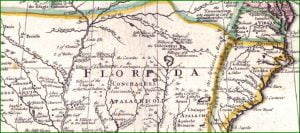Agreement of September 13, 1865
Articles of agreement entered into this thirteenth day of September, 1865, between the commissioners designated by the President of the United States and the persons here present representing or connected with the following named nations and tribes of Indians located within the Indian country, viz: Cherokees, Creeks, Choctaws, Chickasaws, Osages, Seminoles, Senecas, Shawnees, and Quapaws. Whereas the aforesaid nations and tribes, or bands of Indians, or portions thereof, were induced by the machinations of the emissaries of the so-called Confederate States to throw off their allegiance to the government of the United States, and to enter into treaty stipulations with … Read more

